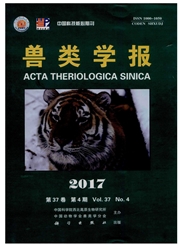

 中文摘要:
中文摘要:
寄生物是调节小哺乳动物种群波动的因子之一。许多生物和非生物因子可影响寄生物的感染。本研究以根田鼠为对象,在野外围栏条件下测定了根田鼠肠道寄生物种类及其感染率,并分析了根田鼠建群者数量、性别、年龄及时间对寄生物感染率的影响。结果表明,根田鼠肠道寄生物有球虫、线虫和绦虫,球虫是主要寄生物,Eimeriawenrichi为球虫中的优势种;其感染率随根田鼠建群者数量增加而增加,且随时间而显著变化。在根田鼠幼体中,高密度处理组Ewenrichi的感染率显著高于低密度处理组,而根田鼠幼体的E.ochrogasteri感染率显著高于成体。本研究未发现根田鼠性别间的球虫感染率差异。上述结果说明,在根田鼠种群中,球虫感染率有时间变化,且受宿主密度的制约,高密度种群引起的生前应激与当前密度制约性感染可能对球虫感染率具有耦合效应。
 英文摘要:
英文摘要:
Parasitism is one of the factors that can regulate fluctuations of small rodent populations. Many biotic and abiotic factors can affect parasite infections. In this study, we examined the types and prevalence of gastrointestinal parasites in root voles (Microtus oeconomus) from field enclosures, and analyzed the effects of the number of founders, sex, age and time on parasite infections. The resuhs showed that intestinal parasites of the root voles are coccidia, cestode and nematodes; and coceidia is the key intestinal parasite; Eimeria wenrichi is a dominant species among the coccidia. We found a positive association between E. wenrichi prevalence and the number of founders; E. wenrichi prevalence significantly increased with time. In addition, E. wenrichi prevalence in juveniles in high density enclosures was higher than that in low density enclosures. E. ochrogasteri prevalence was higher in juveniles than in adults. However, sex-related susceptibility was not found for eoccidian species. These results indicate that coceidian infection varied with time and depended on the density of root vole populations. Prenatal stress due to high density and density-dependent effects on the coccidian infection may have a coupling effect on eoccidian prevalence to the root vole populations.
 同期刊论文项目
同期刊论文项目
 同项目期刊论文
同项目期刊论文
 Four new coccidia (Apicomplexa: Eimeriidae) from the Plateau zokor, Myospalax baileyi Thomas (Rodent
Four new coccidia (Apicomplexa: Eimeriidae) from the Plateau zokor, Myospalax baileyi Thomas (Rodent The synergistic effect of density stress during the maternal period and adulthood on immune traits o
The synergistic effect of density stress during the maternal period and adulthood on immune traits o 期刊信息
期刊信息
